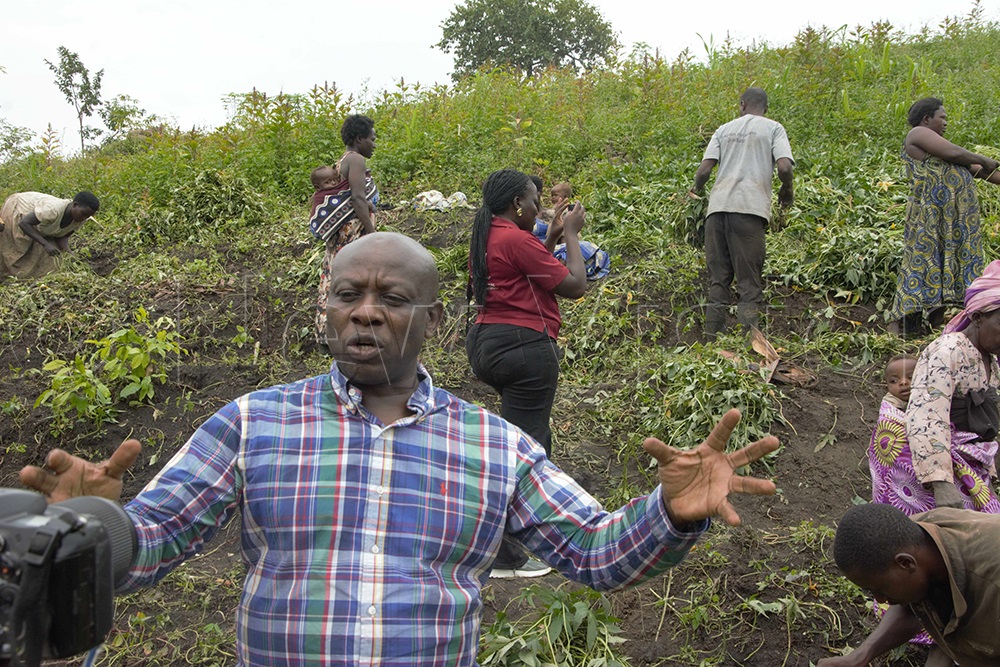Plant nutrient-dense crops to combat malnutrition, Bunyoro refugee host communities told
A coalition of health experts, researchers and non-governmental organisations (NGOs) is pushing this initiative to tackle severe deficiencies in Vitamin A, iron and zinc among children, pregnant mothers and lactating women, a crisis compounded by poor dietary choices and food insecurity.
Joshua Okonya, Program officer at ASERECA (on right), with Dr Noman Kwikiriza, an officer at CIP centre, handing over Vitamin A fleshed sweet potato vines and NAROBEAN seeds to a mother. (Credit: Peter Abaanabasazi)
________________
KIKUUBE - Communities in Bunyoro’s refugee-hosting areas are being mobilised to grow vitamin-rich crops like orange-fleshed sweet potatoes and biofortified beans as a lifeline against malnutrition.
A coalition of health experts, researchers and non-governmental organisations (NGOs) is pushing this initiative to tackle severe deficiencies in Vitamin A, iron and zinc among children, pregnant mothers and lactating women, a crisis compounded by poor dietary choices and food insecurity.
Dr Noman Kwikiriza of the International Potato Centre (CIP) warned that Vitamin A deficiency remains a global scourge, with up to 500,000 children going blind annually and 221,430 dying by 2025 due to related complications. 
David Tumwesige, Senior Agriculture Officer, in charge of Nutrition at the Ministry of Agriculture, said the initiative will promote food and nutrition security. (Credit: Peter Abaanabasazi)
“These are critical years for a child’s development, between birth and age two, when nutrition determines lifelong health,” he said.
“Orange-fleshed sweet potatoes are a simple, accessible solution. A single 25-gram serving meets daily Vitamin A needs, yet many communities still neglect them.”
National Agricultural Research Organisation (NARO)'s Dr Immaculate Mugisa said 50% of Ugandan children under five and over 30% of women of reproductive age suffer from iron-deficiency anaemia. To address this, NARO has developed biofortified bean varieties (NAROBEAN 1–7), which contain 20% more iron and zinc than regular beans.
“These beans can reduce reliance on iron supplements. Growing them is a step toward healthier families,” she says.
The push to adopt these crops is now underway in Kikuube district’s Kyangwali, Kabwoya, and Kiziranfumbi sub-counties, where malnutrition rates are alarming.
With European Union funding, the Association for Strengthening Agricultural Research in Eastern and Central Africa (ASERECA) is partnering with the agriculture ministry and local farmers to distribute planting materials and train communities. Over 300 families have received orange-fleshed sweet potato vines and NAROBEAN seeds, along with guidance on cultivation and nutrition.
“Refugee host communities have land and the potential to produce surplus for sale,” ASERECA’s Joshua Okonya said, noting that Vitamin A deficiency in Kikuube’s refugee areas ranges from 6-9%.
“Once host communities thrive, we’ll expand to refugees themselves.”
The initiative aligns with Kikuube District’s Nutrition Action Plan (2025–2030), which targets a staggering 36.6% stunting rate among children under five and the reality that 63% of them eat only one meal daily. Agriculture ministry's David Tumwesige said, "Biofortified crops are a cornerstone of our food security strategy. Every family must embrace them.”
Speaking at the training of over 200 mothers on nutrition education in Kyangwali trading centre in Kyangwali sub-county on September 23, 2025, ASERECA's Joshua Okonya said they are targeting refugee areas because there is a high prevalence of Vitamin A deficiency (malnutrition) among the children and mothers.